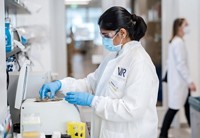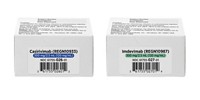Advertisement
Grab your lab coat. Let's get started
Welcome!
Welcome!
Create an account below to get 6 C&EN articles per month, receive newsletters and more - all free.
It seems this is your first time logging in online. Please enter the following information to continue.
As an ACS member you automatically get access to this site. All we need is few more details to create your reading experience.
Not you? Sign in with a different account.
Not you? Sign in with a different account.
ERROR 1
ERROR 1
ERROR 2
ERROR 2
ERROR 2
ERROR 2
ERROR 2
Password and Confirm password must match.
If you have an ACS member number, please enter it here so we can link this account to your membership. (optional)
ERROR 2
ACS values your privacy. By submitting your information, you are gaining access to C&EN and subscribing to our weekly newsletter. We use the information you provide to make your reading experience better, and we will never sell your data to third party members.
Biologics
RECOVERY trial finds COVID-19 antibody treatment reduces death
Preliminary results in people with no detectable SARS-CoV-2 antibodies add to possible uses of engineered antibodies in treating COVID-19
by Megha Satyanarayana
June 18, 2021
New results from the RECOVERY (Randomised Evaluation of COVID-19 Therapy) trial, a massive test of possible COVID-19 treatments, suggests that Regeneron’s engineered antibody treatment can reduce death among people who are hospitalized with COVID-19 and not producing their own antibodies.
Antibody trial by the numbers
40,107
Participants overall in the RECOVERY trial
3,153
People who are seronegative (non-antibody producing) and included in the study
396
People who received the experimental antibody treatment and died
451
People who received standard care only and died
Source: RECOVERY trial.
The trial found that 24% of the people who received the experimental antibody treatment died, versus 30% in the group that did not. In a press release, RECOVERY trial investigators said this translates to six fewer deaths for every 100 people treated with the experimental drug.
The results are important in the continuing quest to define the treatment window for COVID-19, says Pei-Yong Shi, a virologist at the University of Texas Medical Branch who is developing a nasal antibody treatment for COVID-19. But he also cautions that the reduction in mortality is not as high as is seen in treating other viral diseases.
“For those who started to get sick,” Shi says, “what is the window you have? Is it a matter of two days? A week of a window that the therapeutics will have an effect? This is still up in the air.”
The results suggest an addition to the list of possible uses for the Regeneron drug in treating COVID-19, which has killed millions of people worldwide in a pandemic entering its 16th month. The cocktail has an emergency use authorization (EUA) from the US Food and Drug Administration to treat people with mild disease, and other trials have shown some use in preventing infection.
RECOVERY investigators say the preliminary data from the trial suggest that the drug, REGEN-COV, would best be used only on non-antibody producing, or seronegative, hospitalized people. But that requires determining someone’s status ahead of time with antibody testing, a technology that is widely available in developed nations, but less so elsewhere.
The RECOVERY trial has been going on since March 2020, and has tested multiple drugs, including antivirals, anti-inflammatories, and even an antibiotic for their ability to quell COVID-19. The first results were about dexamethasone, a steroid. The inexpensive drug was shown to reduce deaths by up to 33% in people who were hospitalized and on ventilators. It immediately became part of the standard treatment for the disease in many parts of the world.
The trial also found that the anti-inflammatory antibody toculizumab reduced death in the sickest COVID-19 patients. In contrast, trial investigators reported that hydroxychloroquine, hyped by US President Donald J. Trump and others, was ineffective.
The RECOVERY trial is likely the largest clinical trial ever conducted: more than 40,000 people have participated at hospitals in the UK and Asia. For this part of the trial, 1,633 people with no detectable antibodies received REGEN-COV on top of standard COVID-19 care, and 1,520 people received standard COVID-19 care alone.
It’s not clear why some people don’t mount a strong antibody response to the virus on their own, says Shi, who was formerly a pharmaceutical industry scientist. Some people may be immunosuppressed, and others may just be slow to mount that part of the immune response. But other aspects of the immune system are likely working in some of the people in the study who were seronegative—including the overactive inflammatory response in the lungs that tends to land people in the hospital.
“That’s something we need to dive into further,” Shi says.
REGEN-COV is a mix of two engineered monoclonal antibodies, casirivimab and imdevimab, that stick to different places on the SARS-CoV-2 spike protein. The spike protein is how the virus gets into human cells. The antibodies block the virus from infecting new cells, allowing the natural immune response to tackle, among other things, cells that were infected before treatment.
Regeneron is not the only company making antibodies for COVID-19 treatment. Eli Lilly and Company has an EUA for its dual-antibody treatment bamlanivimab and etesivimab, but it recently lost its EUA for bamlanivimab alone because it doesn’t seem to work against some SARS-CoV-2 variants. Vir Biotechnology, in conjunction with GlaxoSmithKline, recently received an EUA for sotrovimab. Vir has said sotrovimab works against many of the common variants of SARS-CoV-2 responsible for many recent infections worldwide.




Join the conversation
Contact the reporter
Submit a Letter to the Editor for publication
Engage with us on Twitter